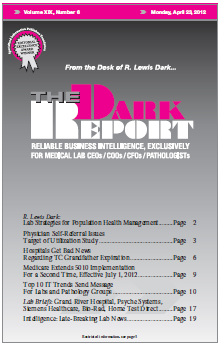CEO SUMMARY: During negotiations to extend the payroll tax cut in February, Congressional negotiators agreed to end the technical component (TC) grandfather provision for more than 1,000 rural hospitals. Seeking to save $50 million annually, Congress said anatomic pathologists would no longer be able to bill Medicare for the TC services on surgical specimens. Pathologists …
Hospitals Get Bad News Re: TC Grandfather Expire Read More »
To access this post, you must purchase The Dark Report.


